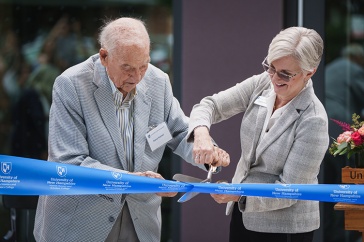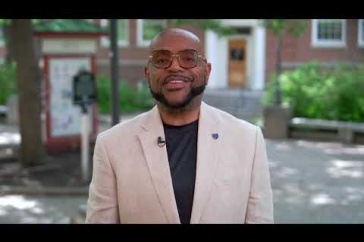
Shanyn Grenier ’97 and Amy Brnger, ’87, ’92G
The story goes like this: A young man with potential was encouraged by the late Joe Sawtelle to go to college. After several exchanges, the boy’s mother asked the New Hampshire Seacoast benefactor to stop talking to her son about furthering his education because it just wasn’t financially possible.
And that’s how the Futures scholarship program at Portsmouth High School was born.
Sawtelle didn’t think a lack of money should prevent qualified students from attending college, so with help from friends, he and his wife started the fund that provides the last dollars needed for selected high school students to continue their schooling. Since its inception 30 years ago, Futures has distributed more than $1.5 million in scholarships, according to program coordinator Amy Brnger, ’87, ’92G.
“This program helps fill the gap that could stop some of our students who have the grades, the drive and the ambition but not the money to attend college,” says Brnger, whose daughter, Audrey Hood, will attend UNH in the fall where her father, Craig Hood, is a professor of art and chairs the art and art history department.
While students may attend the college of their choice, the amount of unmet need Futures will pay is based on the cost to attend UNH, including tuition, fees, room and board. Assistance is provided for up to four years. Students can opt for a two-year college instead or a technical school as long as the program is certified.
“This program helps fill the gap that could stop some of our students who have the grades, the drive and the ambition but not the money to attend college.”
Between eight and 10 students are accepted each year. Currently, Futures scholarships are supporting 28 college students and 30 students in middle or high school. To date, 192 individuals have benefited from the program. Of those, 47 have attended or are now attending UNH.
Futures participants are mentored throughout the course of their education, beginning in eighth grade, when they are selected on the recommendation of teachers and guidance counselors or by applying directly to the program. Income guidelines are about 200 percent of the poverty level. Students are expected to apply for financial aid and scholarships. They also must perform 20 hours of community service a year.
“Some kids get a lot of money. And sometimes a student qualifies the first year but not the second because the family income changes,” Brnger says. Students must fill out a federal financial aid form annually.
“Not everyone gets last dollars,” says Shanyn Grenier ‘97, Portsmouth High School’s college counselor. “About five or six years ago, awards to buy books and gift cards for school supplies were added. Every little bit helps.”
Grenier should know. She was the first student selected for the Futures program when it was started.
“I remember knowing I was part of something that was going to help pay for college and that was comforting,” Grenier says of being recommended to Futures when she was in middle school. “I was kind of a driven kid; it was empowering to think I would have resources like that.”
Being driven earned Grenier enough local scholarship money that she didn’t need Futures help until her junior and senior year.
“Obviously the money is great, but the mentoring the program offers is as important,” Grenier says. “That’s what made me really think I could go to college, that constant encouragement.”
While Futures participants are among the high school students Grenier works with — “They sort of get double duty” — Brnger starts meeting with them when they are still in middle school.
“Those first meetings are to learn about them, about what they want to do and what their thoughts are on college,” Brnger says. “Later I try to help them stay on track, checking in on grades and stress and doing any troubleshooting that’s needed.” Both women offer support and guidance, including having numerous conversations on choosing a college, completing applications and applying for financial aid.
Adds Grenier, “It’s all about helping students answer the question, ‘Where’s the place I’m going to be the best me?'”
-
Written By:
Jody Record ’95 | Communications and Public Affairs | jody.record@unh.edu

















































